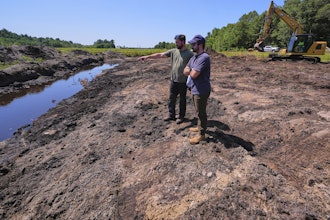| In this June 10, 2013 file photo, guest worker Vegelio Sausera pulls onions while harvesting an onion field in Lyons, Ga. New food safety rules proposed by the federal government could prove cumbersome and costly for Georgia farmers, Agriculture Commissioner Gary Black said. The Republican regulator has asked the U.S. Food and Drug Administration to seek more public comment before finalizing its plans for enforcing the 2011 Food Safety and Modernization Act, which overhauled the country’s system for enforcing food safety laws. (AP Photo/David Goldman, File) |
ATLANTA (AP) — New food safety rules proposed by the federal government could prove cumbersome and costly for Georgia farmers, the state's agriculture commissioner said.
Gary Black, a Republican, was among many who asked the U.S. Food and Drug Administration to change its plans for enforcing the Food Safety Modernization Act, which overhauled the country's system for enforcing food safety laws. FDA officials announced Thursday that they would reconsider some of those proposed rules and give the public another chance to comment on them.
Black said he was concerned that federal regulators would subject farmers who harvest and minimally process crops to rules that are now typically only applied tofood manufacturers. The proposed rules would require that farmers use cleaner water for irrigation, set new restrictions on fertilizing with manure intended to avoid contamination, and set standards for equipment, tools, building and sanitation on farms.
"It's definitely putting a larger burden, as well as a financial burden, for the farmer," said Natalie Adan, director of the food safety division in Black's department.
The FDA's deputy commissioner for foods and veterinary medicine, Michael Taylor, said the agency is looking to revise its proposals and put forward a new draft by early summer.
"Based on our discussions with farmers, the research community and other input we have received, we have learned a great deal, and our thinking has evolved," he said.
Black, a former agriculture industry lobbyist, also raised concerns about a separate rule that would require more farms to adopt plans meant to prevent outbreaks of food-borne illnesses. It noted that the meat, juice and seafood industries operate under similar rules now, and that those rules are generally accepted by industry leaders. However, Black's department said smaller producers who are newly subject to the rule will be unable to pass along the compliance costs to customers.
One food safety expert said that while the rules will cost money, they are necessary to prevent deadly outbreaks of food-borne illness. Contaminants traced back to produce have killed dozens of people, justifying the new requirements for produce growers, said Mike Doyle, director of the University of Georgia's Center For FoodSafety.
In many cases, the new rules would require that farmers take precautions that are already considered good guidelines in the agriculture industry.
"From my perspective, it's all about public health," Doyle said. "We've had so many of these outbreaks."






















